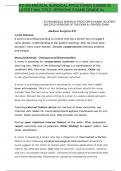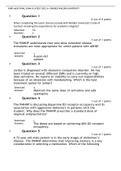-
1. Exam (elaborations) - Ati med-surg proctored exam test bank latest 2023 (new) {ngn}with revised and full 10...
-
2. Exam (elaborations) - Ati med surg proctored exam 2024 real exam questions with well detailed and explaned ...
-
3. Exam (elaborations) - Ati pediatrics proctored 2024
-
4. Exam (elaborations) - Ati med-surg proctored exam test bank latest 2023 (new) {ngn}with revised and full 10...
-
5. Exam (elaborations) - Ati med surg proctored exam 2024 real exam questions with well detailed and explaned ...
-
6. Exam (elaborations) - Ati rn adult medical surgical practice 2019 -2024 with ngn questions and answers
-
7. Exam (elaborations) - Ati teas: science comprehensive questions and answers 100% accuracy (graded a+) (2024...
-
8. Exam (elaborations) - ati teas 7 - science questions and answers . 100% already passed
-
9. Exam (elaborations) - Ati teas science with complete solutions( 100% correct answers)
-
10. Exam (elaborations) - Ati rn pharmacology 2019 – proctored final.
-
11. Exam (elaborations) - Ati autoimmune/ arthritis practice questions and correct answers with complete soluti...
-
12. Exam (elaborations) - Ati nclex challenge 2 questions and complete solutions
-
13. Exam (elaborations) - Ati safe dosage test latest questions and correct answers|already graded a+
-
14. Exam (elaborations) - Ati safe dosage test questions with answers
-
15. Exam (elaborations) - Ati safe dosage questions with correct answers updated
-
16. Exam (elaborations) - Ati dosages by weight test exam questions with correct answers
-
17. Exam (elaborations) - Ati comprehensive exit exam 2023 with ngn (180q&a) and verified 100% guaranteed pass
-
18. Exam (elaborations) - Ati community proctored exam questions with complete solutions
-
19. Exam (elaborations) - Ati mental health proctored questions with complete solutions updated 2024
-
20. Exam (elaborations) - Ati community proctored exam questions with complete solutions verified
-
21. Exam (elaborations) - Ati proctored exam 2023 community health questions and correct answers verified
-
22. Exam (elaborations) - Ati rn maternal newborn 2019 with ngn (proctored) exam questions with complete verifi...
-
23. Exam (elaborations) - Ati rn fundamentals proctored exam questions with complete solutions (a++)
-
24. Exam (elaborations) - Exam 2 practice ati detailed answer key
-
25. Exam (elaborations) - Ati teas 7 exam testbank 2024 exam questions with correct and verified answers by exp...
-
26. Exam (elaborations) - Ati teas a&/ati teas 7 reading updated exam revision questions with complete solution...
-
27. Exam (elaborations) - ati teas test study guide 2023-2024 updated: teas 7 exam prep with practice questio...
-
28. Exam (elaborations) - ati pharmacology proctored exam 2024/2025 questions and answers(latest 2024 /2025upd...
-
29. Exam (elaborations) - Ati fundamentals proctored exam 2024 questions and correct answers approved by expert...
-
30. Exam (elaborations) - Ati nutrition proctored exam 2024 questions with complete solutions verified
-
31. Exam (elaborations) - Ati rn mental health exam 2023/2024 with ngn questions and verified correct answers
-
32. Exam (elaborations) - Ati rn community proctored exam- 7 latest version 2023/2024 guaranteed success (answe...
-
33. Exam (elaborations) - Ati med surg rn critical alterations in gas exchange assessment
-
34. Exam (elaborations) - Ati med surg rn critical alterations in perfusion assessment
-
35. Exam (elaborations) - Ati rn medical surgical proctored exams 25 latest multiple versions exams grade a+
-
36. Exam (elaborations) - Ati intravenous medication administration pretest exam questions with complete soluti...
-
37. Exam (elaborations) - Ati: oral medications test questions and correct answers. 2024/2025.
-
38. Exam (elaborations) - ati leadership exam questions with complete solutions verified graded a+
-
39. Exam (elaborations) - ati leadership actual exam questions and answers with complete solutions verified la...
-
40. Exam (elaborations) - Ati leadership proctored exam questions with complete 100% verified solutions
-
41. Exam (elaborations) - Ati: leadership exam questions and answers 100% solved latest update
-
42. Exam (elaborations) - ati leadership exam questions and answers 100 verified solved
-
43. Exam (elaborations) - Ati leadership final exam questions with complete solutions verified 100% guaranteed ...
-
44. Exam (elaborations) - Ati leadership exam questions and answers with complete solutions latest update
-
45. Exam (elaborations) - Ati leadership exam questions with complete solutions verified
-
46. Exam (elaborations) - Ati leadership proctored exam questions with complete solutions verified answers
-
47. Exam (elaborations) - Ati leadership exam questions and answers with complete verified solutions
-
48. Exam (elaborations) - Ati leadership exam questions and answers with complete solutions latest update
-
49. Exam (elaborations) - Ati leadership actual exam questions with complete solutions verified latest update 2...
-
50. Exam (elaborations) - Ati leadership exam questions with complete solutions verified grared a+ already pass...
-
51. Exam (elaborations) - Ati leadership exam questions 100% solved with complete solutions
-
52. Exam (elaborations) - Ati leadership b exam questions with complete solutions verified 2024/2025
-
53. Exam (elaborations) - Ati leadership exam questions with complete solutions
-
54. Exam (elaborations) - Ati leadership exam questions and answers with complete solutions latest update 2024/...
-
55. Exam (elaborations) - Ati leadership practice exam questions with complete solutions verified graded a+
-
56. Exam (elaborations) - Ati leadership exam questions with complete solutions verified graded a+
-
57. Exam (elaborations) - Ati leadership proctored actual exam questions and answers with complete solutions
-
58. Exam (elaborations) - Ati leadership proctor exam questions with complete solutions verified graded a+
-
59. Exam (elaborations) - Ati capstone leadership exam questions with complete solutions verified graded a+
-
60. Exam (elaborations) - Ati leadership ch 5 exam questions and answers with complete solutions verified
-
61. Exam (elaborations) - Ati leadership exam questions with complete solutions verified graded a+
-
62. Exam (elaborations) - ati leadership proctored exam questions with complete solutions verified graded a+
-
63. Exam (elaborations) - Ati leadership study-guide exam questions with complete solutions verified graded a+
-
64. Exam (elaborations) - Ati leadership ch1 exam questions with complete solutions
-
65. Exam (elaborations) - Ati leadership practice questions and answers with complete solutions graded a
-
66. Exam (elaborations) - ati leadership + public health exam questions with complete solutions verified grade...
-
67. Exam (elaborations) - Ati leadership and management chap 1 exam questions with complete solutions
-
68. Exam (elaborations) - Ati community health exam questions with complete solutions verified
-
69. Exam (elaborations) - Ati community health exam questions with complete solutions verified graded a+
-
70. Exam (elaborations) - Ati community health exam questions with complete solutions verified
-
71. Exam (elaborations) - Ati community health exam questions with complete solutions verified
-
72. Exam (elaborations) - Ati community health actual exam questions with complete solutions verified graded a+
-
73. Exam (elaborations) - Ati community health exam questions with complete solutions verified graded a
-
74. Exam (elaborations) - Ati community health exam questions with complete solutions graded a+ latest update
-
75. Exam (elaborations) - Ati community health exam questions with complete solutions verified graded a+
-
76. Exam (elaborations) - Ati community health exam questions with complete solutions verified graded a+ latest...
-
77. Exam (elaborations) - Ati community health exam questions with complete solutions verified answers
-
78. Exam (elaborations) - Ati - community health (retake) exam questions with complete solutions verified
-
79. Exam (elaborations) - Ati community health nursing exam questions with complete solutions verified graded a...
-
80. Exam (elaborations) - Ati community health nursing exam questions with complete solutions verified graded a...
-
81. Exam (elaborations) - ati community health quiz exam questions with complete solutions verified graded a+
-
82. Exam (elaborations) - Ati community health questions and answers with complete solutions verified graded a...
-
83. Exam (elaborations) - Ati community health questions and answers with complete solutions verified graded a+
-
84. Exam (elaborations) - ati community health practice a exam questions and answers with complete solutions v...
-
85. Exam (elaborations) - Ati community health exam questions with complete solutions verified graded a+
-
86. Exam (elaborations) - Ati community health nursing- chapter 2 exam questions with complete solutions verifi...
-
87. Exam (elaborations) - Ati community health practice exam b exam questions with complete solutions verified ...
-
88. Exam (elaborations) - Ati capstone leadership & community health exam questions with complete solutions lat...
-
89. Exam (elaborations) - Ati communication exam questions with complete solutions verified graded a+
-
90. Exam (elaborations) - Ati community historical influences on community and public health exam questions wit...
-
91. Exam (elaborations) - Ati community health learning system 3.0 exam questions with complete solutions verif...
-
92. Exam (elaborations) - Ati community population, public, and global health exam questions and answers with c...
-
Show more





